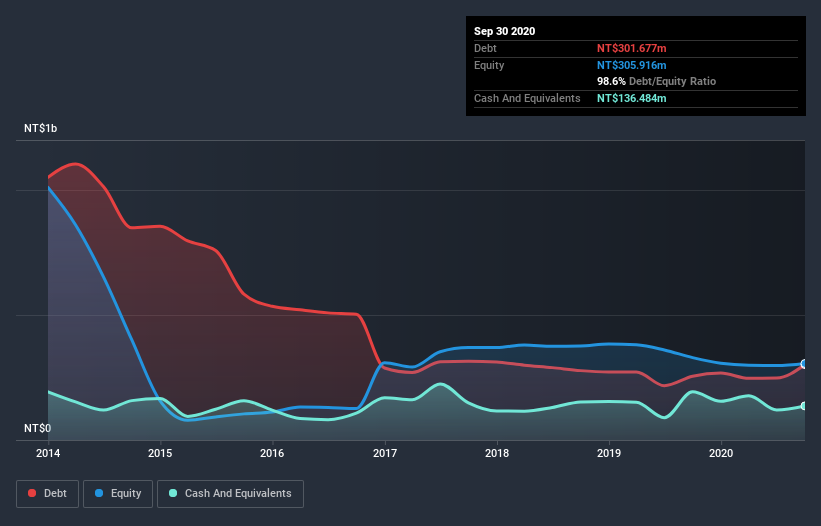- Taiwan
- /
- Electronic Equipment and Components
- /
- TPEX:6246
Is Taiwan Thick-Film Ind (GTSM:6246) A Risky Investment?

David Iben put it well when he said, 'Volatility is not a risk we care about. What we care about is avoiding the permanent loss of capital.' So it might be obvious that you need to consider debt, when you think about how risky any given stock is, because too much debt can sink a company. We can see that Taiwan Thick-Film Ind. Corp (GTSM:6246) does use debt in its business. But the real question is whether this debt is making the company risky.
When Is Debt A Problem?
Debt assists a business until the business has trouble paying it off, either with new capital or with free cash flow. In the worst case scenario, a company can go bankrupt if it cannot pay its creditors. However, a more frequent (but still costly) occurrence is where a company must issue shares at bargain-basement prices, permanently diluting shareholders, just to shore up its balance sheet. Of course, debt can be an important tool in businesses, particularly capital heavy businesses. When we examine debt levels, we first consider both cash and debt levels, together.
View our latest analysis for Taiwan Thick-Film Ind
What Is Taiwan Thick-Film Ind's Net Debt?
As you can see below, at the end of September 2020, Taiwan Thick-Film Ind had NT$301.7m of debt, up from NT$255.0m a year ago. Click the image for more detail. However, it also had NT$136.5m in cash, and so its net debt is NT$165.2m.

How Healthy Is Taiwan Thick-Film Ind's Balance Sheet?
The latest balance sheet data shows that Taiwan Thick-Film Ind had liabilities of NT$622.7m due within a year, and liabilities of NT$131.1m falling due after that. On the other hand, it had cash of NT$136.5m and NT$554.0m worth of receivables due within a year. So it has liabilities totalling NT$63.2m more than its cash and near-term receivables, combined.
Since publicly traded Taiwan Thick-Film Ind shares are worth a total of NT$484.4m, it seems unlikely that this level of liabilities would be a major threat. Having said that, it's clear that we should continue to monitor its balance sheet, lest it change for the worse.
In order to size up a company's debt relative to its earnings, we calculate its net debt divided by its earnings before interest, tax, depreciation, and amortization (EBITDA) and its earnings before interest and tax (EBIT) divided by its interest expense (its interest cover). The advantage of this approach is that we take into account both the absolute quantum of debt (with net debt to EBITDA) and the actual interest expenses associated with that debt (with its interest cover ratio).
Taiwan Thick-Film Ind shareholders face the double whammy of a high net debt to EBITDA ratio (5.9), and fairly weak interest coverage, since EBIT is just 0.74 times the interest expense. The debt burden here is substantial. However, the silver lining was that Taiwan Thick-Film Ind achieved a positive EBIT of NT$7.4m in the last twelve months, an improvement on the prior year's loss. When analysing debt levels, the balance sheet is the obvious place to start. But you can't view debt in total isolation; since Taiwan Thick-Film Ind will need earnings to service that debt. So if you're keen to discover more about its earnings, it might be worth checking out this graph of its long term earnings trend.
Finally, a business needs free cash flow to pay off debt; accounting profits just don't cut it. So it is important to check how much of its earnings before interest and tax (EBIT) converts to actual free cash flow. Over the last year, Taiwan Thick-Film Ind saw substantial negative free cash flow, in total. While investors are no doubt expecting a reversal of that situation in due course, it clearly does mean its use of debt is more risky.
Our View
To be frank both Taiwan Thick-Film Ind's interest cover and its track record of converting EBIT to free cash flow make us rather uncomfortable with its debt levels. But at least its level of total liabilities is not so bad. Looking at the bigger picture, it seems clear to us that Taiwan Thick-Film Ind's use of debt is creating risks for the company. If all goes well, that should boost returns, but on the flip side, the risk of permanent capital loss is elevated by the debt. When analysing debt levels, the balance sheet is the obvious place to start. But ultimately, every company can contain risks that exist outside of the balance sheet. Case in point: We've spotted 4 warning signs for Taiwan Thick-Film Ind you should be aware of, and 2 of them are concerning.
At the end of the day, it's often better to focus on companies that are free from net debt. You can access our special list of such companies (all with a track record of profit growth). It's free.
If you decide to trade Taiwan Thick-Film Ind, use the lowest-cost* platform that is rated #1 Overall by Barron’s, Interactive Brokers. Trade stocks, options, futures, forex, bonds and funds on 135 markets, all from a single integrated account. Promoted
Valuation is complex, but we're here to simplify it.
Discover if Taiwan Thick-Film Ind might be undervalued or overvalued with our detailed analysis, featuring fair value estimates, potential risks, dividends, insider trades, and its financial condition.
Access Free AnalysisThis article by Simply Wall St is general in nature. It does not constitute a recommendation to buy or sell any stock, and does not take account of your objectives, or your financial situation. We aim to bring you long-term focused analysis driven by fundamental data. Note that our analysis may not factor in the latest price-sensitive company announcements or qualitative material. Simply Wall St has no position in any stocks mentioned.
*Interactive Brokers Rated Lowest Cost Broker by StockBrokers.com Annual Online Review 2020
Have feedback on this article? Concerned about the content? Get in touch with us directly. Alternatively, email editorial-team@simplywallst.com.
About TPEX:6246
Taiwan Thick-Film Ind
Manufactures and sells transformers, backlight modules, light emitting diode (LED) light bars, and light guide plates.
Excellent balance sheet and slightly overvalued.
Market Insights
Community Narratives



